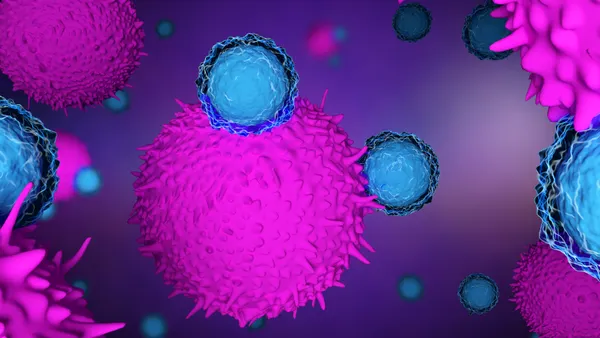Dive Brief:
- Arvinas lost more than half of its market value Tuesday morning after the Connecticut-based biotechnology company and partner Pfizer disclosed anticipated results from a late-stage clinical trial of a new kind of breast cancer drug they’re developing.
- Arvinas and Pfizer described the findings as a “significant achievement,” citing the pronounced benefit they observed in a subgroup of patients with a specific breast cancer mutation. But analysts had hoped the drug, called vepdegestrant, might work more broadly.
- The companies only released summary data from the study, indicating that results “exceeded the pre-specified target” for showing a benefit on progression-free survival versus the trial’s comparator drug, fulvestrant, in that subgroup of patients. The difference between the groups overall was not significant.
Dive Insight:
Fulvestrant has been on the market for more than two decades, during which it’s become a standard treatment for metastatic breast cancers that rely on high estrogen levels and don’t express a protein called HER2. It works by binding to, and helping degrade, estrogen receptors on tumor cells.
For several years now, researchers have sought to develop new kinds of estrogen-degrading therapies, including ones that can be taken orally rather than injected like fulvestrant. One, from Menarini Group, was approved in 2023, while another, from Eli Lilly, recently posted positive data in Phase 3 testing.
Arvinas is trying to do the same, but with a drug that works in a different way. Known as a “PROTAC,” or proteolysis-targeting chimera, it is designed to prod cells into trashing disease-linked proteins, such as the estrogen receptor.
Arvinas is a leader in this field of targeted protein degradation, so Tuesday’s data were also looked to as a test of whether these types of medicines can be more effective than other approaches.
At least so far, vepdegestrant doesn’t appear to have clearly outperformed other next-generation estrogen-targeting drugs. The benefit Arvinas and Pfizer reported as statistically significant was in trial participants who have mutations in a gene called ESR1. Treatment led to at least a 40% reduction in the risk of tumor progression or death among this subgroup — about on par with data for Menarini’s approved Orserdu and Lilly’s still experimental imlunestrant.
“Investors were hoping for the drug to work more broadly than the oral [selective estrogen-receptor degrader]s and demonstrate activity in patients without an ESR1 [mutation],” wrote Andrew Berens, an analyst at Leerink Partners, in a client note.
Berens also noted how the data did not yet show a survival benefit in either the ESR1 group or the broader study population. While that’s not unexpected, as survival data takes a longer time to mature, Arvinas and Pfizer didn’t characterize whether results were trending in a direction that might eventually favor their drug.
Analysts Li Watsek, of Cantor Fitzgerald, and Bradley Canino, of Stifel, also view Arvinas’ data as roughly on par, but not better, than the results for Menarini’s and Lilly’s drugs.
“Unfortunately, this means PROTAC may not be as differentiated as oral SERDs, which so far have only been shown to be superior to fulvestrant in the ESR1 [mutant] patients,” Watsek wrote in a client note.
Pfizer and Arvinas said treatment with vepdegestrant was “generally well tolerated,” with a safety profile consistent with prior testing. The company plans to present full data from the study at a medical meeting later this year, as well as discuss the data with regulators to determine the path forward to approval applications.















